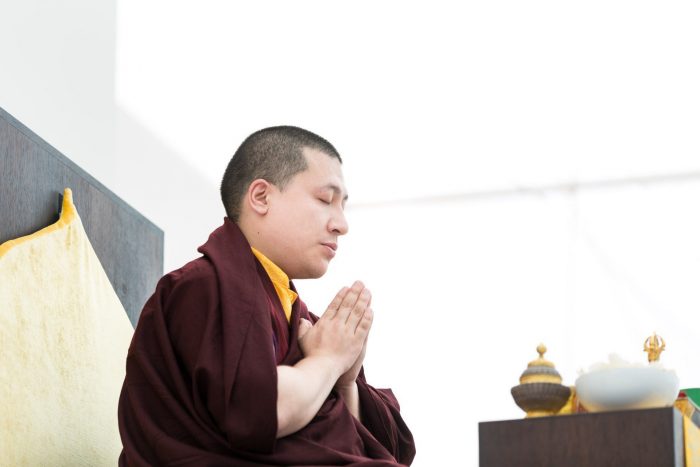Karmapa Public Course 2024 streaming
March 4, 2024
In the run-up to the United Nations International Day of Peace, Thaye Dorje, His Holiness the 17th Gyalwa Karmapa, gives a teaching on how to prepare for peace:
As we approach the United Nations International Day of Peace on 21st September, it is a good time for us to consider how we prepare for peace. In Tokme Zangpo’s 14th century text ‘The 37 Practices of a Bodhisattva,’ the 14th practice loosely translates as: ‘Even if someone broadcasts throughout the billion worlds all sorts of offensive remarks about you, speaking in turn of that person’s positive qualities, with a loving mind, is the practice of a Bodhisattva.’
As this practice reflects, peace can sometimes be difficult, particularly if someone is maligning and criticising us. However, from a spiritual point of view, the biggest challenge does not lie in the criticism itself, but rather in the grasping aspect of the mind, the idea of a self, and all that ensues from it.
In a world where there is such a great emphasis on speech and communication – we might call it the vocal world – it can be easy for this grasping aspect of the mind to focus mainly on the image of ourselves. Then, when there is some kind of sharp criticism, the self will naturally defend itself. It may lead to the mind becoming disturbed by emotion, and to thoughts, words and actions of retaliation. This creates, or rather completes, an unhelpful cycle. By responding in this way, we can give rise to a great deal of commotion, and the story will go on in a predictable fashion.
The aim of a Bodhisattva, someone on the path to enlightenment, is to bring down commotion, not to amplify it. The aim is to create stillness, not storms, and to focus on what really causes the commotion in the first place. In this case, we can see that the real problem is the fact that we are grasping onto the image of ourselves. We may put a great deal of effort into our image. This image exists within the world of words, in the form of a name, a title, and so on. And since it is not just us who focuses on this image, but also others who direct their thoughts towards that same point, it appears vividly, like a reflection in a mirror. This image is now open to being attacked, so to speak.
Under these circumstances, it is important that we keep our minds calm, that our minds are at peace and not disturbed by emotion. Otherwise, if our name, our image is attacked, then although others are just attacking our name, our image – just the reflection in the mirror and not even our physical body – we may still feel hurt and give rise to unnecessary commotion.
In the case of a Bodhisattva, building up the reflection in the mirror, projecting this reflection into the world, is important if it is of benefit to others.
In some cases, it may be that others’ criticisms are constructive, in which case the brave and courageous mind will see merits in these criticisms and embrace them. Only a wise mind can embrace criticism.
However, when we are criticised in an unconstructive way, as described in this practice, we should think of such words as mere echoes, and nothing more.
As we prepare for peace, and for the United Nations International Day of Peace, may we remember that the karma that is created through harsh criticisms is only completed if we reciprocate. We have the power and choice to journey on the path of a Bodhisattva. We can not control all of the conflict in our world, but we can control our response to it. We can help ensure that we do not create more harm, we do not cause more commotion, but instead prepare for peace by letting go of grasping, by keeping the mind calm and tapping into the eternal pool of compassion and wisdom that lies within all of us. For it is within this pool, this Inner Wealth, that the source of peace lies.”

Thaye Dorje, His Holiness the 17th Karmapa, teaches around the world about peace
Follow Karmapa on social media